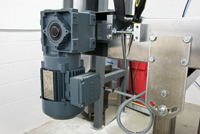
Making the cut
By Andrew Joseph, Features Editor
Automation food processing food service packaging quality controlQuebec veal processor leverages high product quality and packaging excellence to cement its industry leadership credentials and pedigree
As a healthy and tasty protein option, it is pretty tough to go wrong with veal—an important, time-honored ingredient in Italian and French cuisine since ancient times and, more recently, an increasingly popular choice among North American consumers for all the right reasons, including low fat content, subtle taste profile, buttery-soft texture, and a wealth of highly beneficial nutrients such as zinc, iron and Vitamin B12.
Naturally, this is all part of a very healthy trend for companies like the Laval, Que.-headquartered Montpak International, a vertically-integrated supplier of veal products to the retail and foodservice markets operating two Quebec-based veal processing plants in Laval and Sainte-Angéle-De-Prémont, along with North America’s largest HACCP (Hazard Analysis Critical Control Points)-certified abattoir (slaughterhouse) in St-Gérmain, Que.
Today ranking as one of the leading players in Quebec’s $500-million veal processing industry, the family-owned company—founded by Mike Buksbaum back in 1959 and now owned by the Buksbaum and Fontaine families—posted revenues of over $75 million last year, according to Montpak vice-president of operations Alex Fontaine.
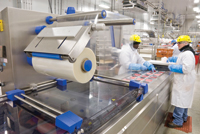
Workers at Montpak International’s Laval facility place cuts of veal onto a bottom film so a Reiser Repack RE 20 form-fill-seal machine can add a top web to vacuum seal it.
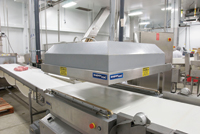
A new Reiser SuperVac chamber machine uses a high-pressure sealing system for a strong, reliable seal.
Describing Montpak as a fully-fledged “field-to-fork enterprise” involved in all aspects of the veal business—including feed manufacturing, slaughtering, processing, transportation and research and development (R&D)—Fontaine points to the 2006 merger with former competitor Bellivio Transformation Inc. as a defining moment in his company’s metamorphosis into a regional industry powerhouse.
Montpak and Bellivio in fact used to share the same slaughtering facilities since the early 1990s, recalls Fontaine, “and while both companies were doing quite well, we discovered that we were both actually shooting ourselves in the foot somewhat.
“Eventually, we both realized that we would be able to succeed better if we removed that element of competition between us and worked together as one entity,” Fontaine told Canadian Packaging recently, explaining how Bellivio’s strength in retail markets and Montpak’s clout in the foodservice sector quickly positioned the combined enterprise as a leading industry player.
“When we merged our two operations, Montpak became one of the biggest veal companies in all of North America,” Fontaine states.
The bulk of Montpak’s processing work takes place at the company’s federally-inspected, HACCP-certified, 75,000-square-foot facility that employs 180 workers to process over 100,000 kilograms of veal per week, Fontaine relates, adding that the company enjoys a stellar reputation for high product quality and unfailing customer service.
And unlike many veal processors who specialize either in milk-fed or grain-fed veal—the former being milder-tasting and lighter-colored than the stronger-flavored, pink-colored grain-fed variety—Montpak does both equally well, Fontaine points out.
“We take a great sense of pride in being able to offer both milk-fed and grain-fed veal to food retailers, foodservice distributors, further processors and end-users,” explains Fontaine.
“It presents choice—and choice is always a good opportunity for consumers to enjoy different veal products with unique textures and taste profiles.
“In addition to our superb, high-quality products, what also really separates us from the competition is our attention to our customers,” Fontaine asserts.
“They know that we constantly work to ensure consistent high quality in our veal that is, above all, completely safe—allowing them to concentrate on satisfying their customers.”
Adds Buksbaum: “From farm to factory, our processes are consistent with all the HACCP guidelines,” he says, “but it is of equal importance that no product will leave our plants without meeting our own high safety standards.”
While the veal industry has taken some consumer backlash in recent years as a fallout from some of the more controversial farming practices in the meat industry at large, Fontaine is adamant that Montpak is an industry leader when it comes to humane treatment of calves.
“We are the first veal company in North America to be awarded the ‘Humane Certification’ by the American Humane Association for our NaturReserve Certified Grain-fed Veal program,” Fontaine states, citing Montpak’s use of the production monitoring services of Agri-Traceabilitié Québec to identify each animal’s origins and movement throughout its integrated supply chain—ensuring strict health surveillance from farm to slaughterhouse in order to safeguard the health of the herd, as well as the consumers.
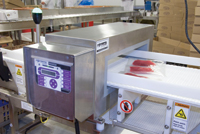
One of the three new Phantom metal detection systems from Fortress Technology brought into the plant to maintain strict quality control levels for each and every product leaving the Laval facility.
Retailing at most major retail chains throughout Canada and the U.S., Montpak’s products comprise three main popular brand families, including:
• International Selections—fully-cooked entrées like its Veal Roll and Veal Parmigiana;
• Veal Perfections—a line of portion-aged veal products like Veal Tournedos;
• Veal Inspirations—cooked and raw value-added line featuring further-processed products such as stuffed Veal Scaloppini.
“But it is not enough to simply produce the best quality meat and leave it at that,” Fontaine states. “We have to make sure that high quality is maintained until it is delivered to the consumer.
“By investing in superior packaging technology, we ensure our products are safe, convenient and appealing to today’s consumer,” says Fontaine noting the Laval plant continuously invests in high-performance packaging machinery and equipment.
This willingness to invest is well-supported by the recent purchases of a Reiser Repak RE 20 form-fill-seal machine; a Reiser SuperVac automatic belt vacuum chamber packaging machine; and a Cryovac Old Rivers 8600E vacuum-packing machine from Sealed Air Corporation.
Supplied through Reiser’s Burlington, Ont.-based Reiser Canada subsidiary, the Repak RE 20 machine is a stainless-steel, washdown-ready, horizontal form/fill/seal (H/F/F/S) system used by Montpak to seal in the fresh cuts of veal in vacuum packaging, as well as vacuum skin packages and plastic packages with formed top webs.
Capable of handling film widths of up to 460 millimeters—and maximum cutoff length of 600-mm with maximum drawing depth of 120-mm—the RE 20 is designed for maximum production flexibility, according to Reiser, with its modular design facilitating easy washdowns.
Equipped with the SYS drive-speed control and a touchscreen control system from Omron Electronics LLC, the RE 20 also features a self-diagnostic system for fault finding, along with easy access for cleaning and maintenance.
“It’s been a wonderful machine for us,” extols Fontaine, “providing our meats with a clear, sharp package that protects the product for the customer, while still presenting it in a beautiful manner.
“Also, the vacuum-pack seal it provides for our product is of excellent quality.”
Fontaine says he is also fond of Reiser’s SuperVac chamber packaging machine, which features a double bioactive high-pressure sealing system whereby heat and pressure are applied from above and below the film to produce two very secure seals.
For its part, the plant’s new Cryovac Old Rivers 8600E octopus-style vacuum packing rotary chamber machine from Sealed Air produces a nice, skin-tight seal that provides both superb product protection and great product visibility for the packaged product, according to Fontaine.
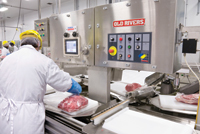
A Cryovac Old Rivers 8600E vacuum-packing machine from Sealed Air generates highly-durable, skintight seals around the contours of the fresh veal cuts.
To ensure strict quality control on all its packaging lines, the Laval plant employs one metal detection system from Mettler-Toledo Safeline, Fontaine relates, as well as three new Phantom metal detection units manufactured by the Toronto-based Fortress Technology Inc.—outfitted with rectangular apertures to provide optimal performance for Montpak’s specific application requirements.
“We just love the Fortress Phantom metal detection units,” Fontaine states. “They are very fast with the scanning of the meat products, they are easy to use, and have never provided a ‘false positive’ reading at our plant since we got them.”
After the primary packaging is done, the sealed meat products are transferred via a conveyor—powered by a SEW-Eurodrive motor—to be packed into corrugated cartons supplied by Montreal-headquartered paper products manufacturer Kruger Inc.
This secondary packaging phase is handled by the model BMF 30.5 case erector manufactured by the by the French machine-builder Meca-Systeme/SNP, and distributed in Canada by the Montreal-based Meca-Pac Inc.
Constructed of stainless steel and profiled aluminum, the fully-automatic case erector makes quick work of forming, folding and gluing the four-sided cartons with a high-performance, hot-melt adhesive injector distributed by a rotary pump fed by an eight-liter holding tank.

Outfitted with pivoting Magelis interface from Schneider Electric, a Meca-Systeme BMF 30.5 case erector builds finished cartons around the packaged veal products.
Designed for easy maintenance and quick, two-minute manual changeovers enabled by manipulating the machine’s two starwheels, the durable, robust BMF 30.5 machine is set up to work as an autonomous system—requiring only occasional operator supervision—that can erect and form corrugated boxes at rates of between 1,200 and 1,800 cases per hour, depending on box design and complexity.
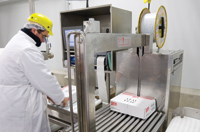
An all-steel strapping machine from Samuel Strapping Systems is used to wrap a security band around cartons of veal products.
According to Fontaine, the Meca-Systeme case erector provides a good example of Montpak’s commitment to using the highest-quality equipment and processes throughout its production flow process.
“We’ve always been fans of having the best equipment we can find to help us showcase our products,” says Fontaine. “And to continue adding value and efficiency is the key. These machines keep operations running smoothly.
“The veal industry is a very competitive one, and we are always looking for that edge that will enable us to garner more of the market.
“With our continuing efforts to create a better product, we are confident that our state-of-the-art equipment will help us expand our markets.”
Photos By Pierre Longtin
Advertisement



